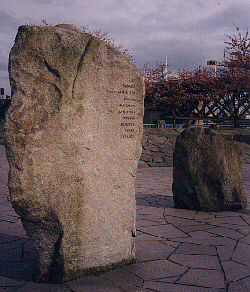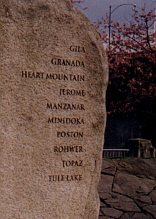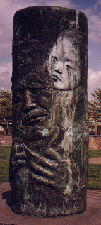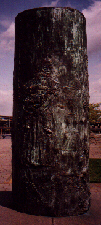Portland Hanami 2000
Japanese American Historical Plaza
Portland, Oregon, USA
|
Portland's Japanese American Historical Plaza tells the story
of people who immigrated to the Pacific Northwest from Japan
around the turn of the century and their descendents.
| |
|
Two copper columns frame the approach to the plaza:
The right-hand column (RIGHT) features children on the train to internment camp, a mother and child in the shadow of a camp sentry tower, and Nikkei U.S. servicemen. |
|
|
The centrepiece of the plaza is an upright slab of rock
(RIGHT) that lists
the names of the internment camps to which
Japanese Americans were sent. For former internees, just sight of
these names evokes strong memories. The Internment shattered lives and
forever changed people, as conveyed by the surrounding "crazy pavement".
bitter memories endure." |

|
|
As in other West Coast cities,
the 3,676 Nikkei-jin from Portland, Oregon's Willamette Valley and Washington's Yakima Valley
were deemed (despite the lack of evidence) a risk to national security
by the U.S. government and were rounded up after Japan's attack on Pearl Harbor.
They were kept in animal pens at the Pacific International Livestock Exposition Hall
in preparation for transfer to the internment camps. A 29 April 1942 headline in
The Oregonian
newspaper proclaimed that Portland would be the first U.S. city
to rid itself of Japanese Americans.
| |

|
GILA GRANADA HEART MOUNTAIN JEROME MANZANAR MINIDOKA POSTON ROHWER TOPAZ TULE LAKE |

 The left-hand column (LEFT) shows the arrival
of the Issei (the first immigrants)
and nurturing of generations,
a grandparent and his grandchild.
The left-hand column (LEFT) shows the arrival
of the Issei (the first immigrants)
and nurturing of generations,
a grandparent and his grandchild.